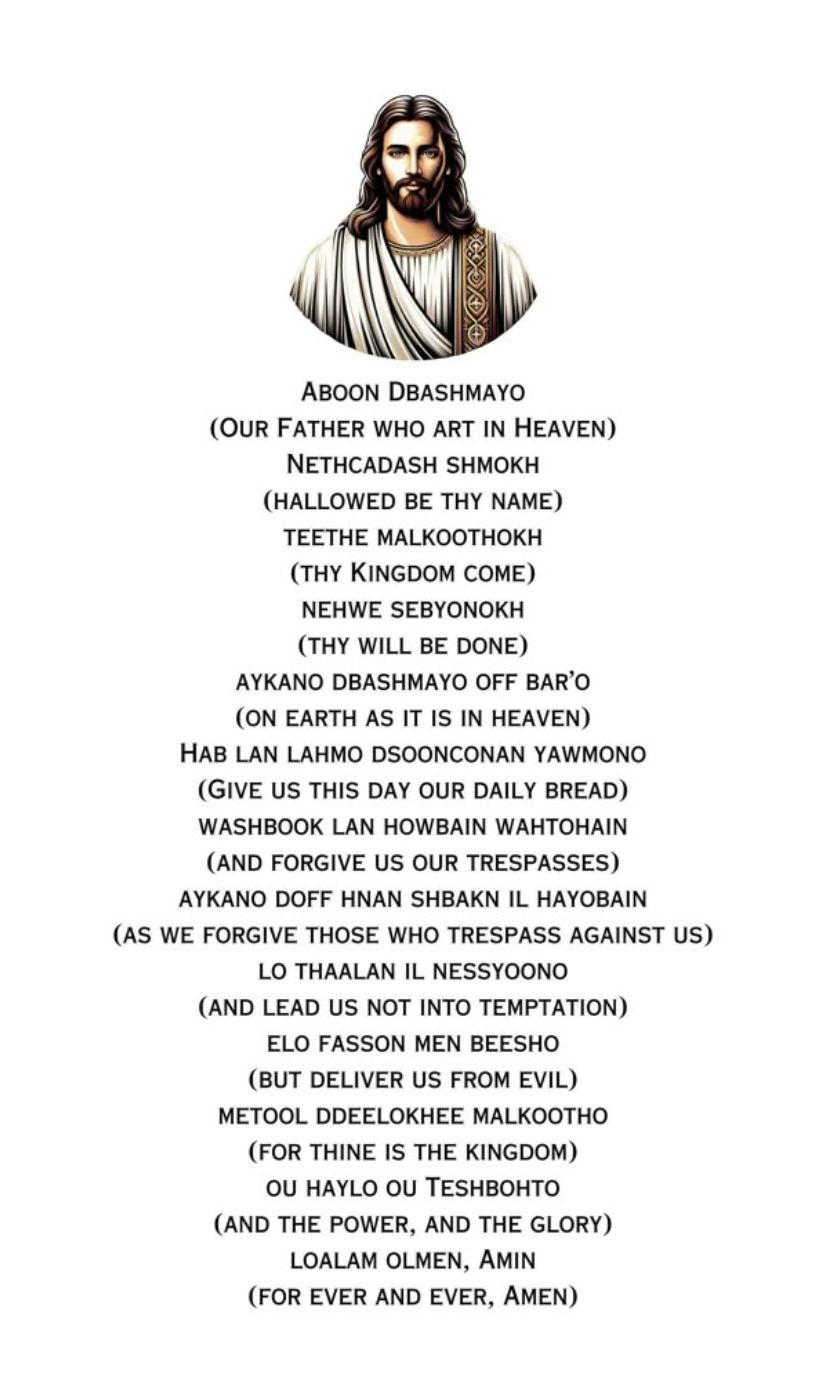By Shanaz Joan Parsan
Aramaic (Syriac Peshitta):
ܐܒܘܢ ܕܒܫܡܝܐ، ܢܬܩܕܫ ܫܡܟ. ܬܐܬܐ ܡܠܟܘܬܟ. ܢܗܘܐ ܨܒܝܢܟ ܐܝܟܢܐ ܕܒܫܡܝܐ ܐܦ ܒܐܪܥܐ. ܗܒ ܠܢ ܠܚܡܐ ܕܣܘܢܩܢܢ ܝܘܡܢܐ. ܘܫܒܘܩ ܠܢ ܚܘ̈ܒܝܢ ܐܝܟܢܐ ܕܐܦ ܚܢܢ ܫܒܩܢ ܠܚܝ̈ܒܝܢ. ܘܠܐ ܬܥܠܢ ܠܢܣܝܘܢܐ، ܐܠܐ ܦܨܐ ܠܢ ܡܢ ܒܝܫܐ.
Transliteration:
Abún d-bashmáyo, nithqadásh shmokh. Tēthē malkúthakh. Nehweh ṣebyónakh eykánnā d-bashmáyo af b-ar‘ā.
Hav lán lahmá d-súnqanān yómanā. W-shbuq lán ḥawbayn eykánnā d-ap ḥnán shbaqán l-ḥayyābayn.
W-lā ta‘lán l-nesyónā, elā paṣṣān men bīshā.
Literal English Translation:
Our Father who is in the heavens,
may Your Name be hallowed.
May Your Kingdom come.
May Your will be done, as in heaven, so also on earth.
Give us our needed bread today.
And forgive us our debts, as we also forgive our debtors.
And do not bring us into a trial, but deliver us from the evil one.
Commentary and Eternalist Reflections
1) Our Father who is in the heavens (ܐܒܘܢ ܕܒܫܡܝܐ – Abun d-bashmayo)
“Father” invokes intimacy, covenant, and filial love. “In the heavens” affirms transcendence, not distance—God’s being pervades all creation.
Eternalism teaches that all time is equally present to God; hence our identity as God’s children spans the whole timeline of our existence.
Practical reflection: Live as beloved—your relationship with God is not episodic but continuous across time. Every moment is held in His fatherly gaze.
2) May Your Name be hallowed (ܢܬܩܕܫ ܫܡܟ – nithqadash shmokh)
To ‘hallow’ the Name means to sanctify God’s presence in every thought and deed.
The eternalist perspective suggests that God’s holiness is already perfect outside time; we are praying to bring our finite story into harmony with His eternal sanctity.
Application: Speak, act, and create in ways that reveal God’s holiness to the world—aligning each temporal act with eternal reverence.
3) May Your Kingdom come (ܬܐܬܐ ܡܠܟܘܬܟ – tēthē malkuthakh)
The Kingdom (malkutha) signifies God’s active reign—justice, mercy, and truth. It is not distant; it is already real in God’s eternal now.
Eternalism reframes this petition as participation: we ask to become instruments by which the already-existing Kingdom is unveiled in time.
Application: Embody Kingdom values—mercy, equity, and peace—in your life, knowing you manifest the eternal Kingdom in the temporal realm.
4) May Your will be done on earth as in heaven (ܢܗܘܐ ܨܒܝܢܟ – nehweh ṣebyónakh)
Heaven is where God’s will is perfectly accomplished. Earth is invited to reflect that harmony.
Under eternalism, God’s will is eternally fulfilled; this prayer becomes a voluntary alignment: ‘Let my temporal will converge with Your eternal wisdom.’
Application: In discernment and decision, pray to see your choices as part of an eternal pattern authored by God.
5) Give us our needed bread today (ܗܒ ܠܢ ܠܚܡܐ ܕܣܘܢܩܢܢ ܝܘܡܢܐ – hav lan lahma d-súnqanān yómanā)
The phrase ‘bread of our necessity’ refers to daily sustenance—both material and spiritual (Eucharistic and Scriptural).
Eternalism teaches that all provision exists in God’s timeless abundance; we pray to receive what grace He has already willed for each moment.
Application: Trust in divine timing. Seek daily sufficiency, not surplus, and recognize the Eucharist as timeless sustenance.
6) Forgive us our debts, as we forgive our debtors (ܘܫܒܘܩ ܠܢ ܚܘ̈ܒܝܢ – w-shbuq lan ḥawbayn)
In Semitic idiom, debts = sins, the moral obligations of love unfulfilled.
God’s forgiveness is eternally accomplished in Christ; when we forgive, we synchronize our temporal hearts with His eternal mercy.
Application: Let forgiveness rewrite your past—heal temporal wounds by entering the eternal flow of divine mercy.
7) Lead us not into trial, but deliver us from evil (ܘܠܐ ܬܥܠܢ ܠܢܣܝܘܢܐ – w-lā ta‘lán l-nesyónā)
‘Trial’ or ‘temptation’ refers to testing that could lead to spiritual failure. We ask not for exemption from testing but for protection within it.
From an eternalist lens, God already knows every test and its resolution; we pray to walk the path where His grace intersects our freedom.
Application: Stay vigilant and grounded in prayer; when trials come, remember that deliverance is already contained within God’s eternal plan.
8) For Yours is the Kingdom, the Power, and the Glory forever
A doxology affirming eternal sovereignty.
Under eternalism, this acclamation describes the ever-present reality: God’s kingship and glory are not future hopes but timeless truths.
Application: End prayer in praise—affirm God’s supremacy as the unchanging axis of the cosmos.
Summary Reflection
The Lord’s Prayer invites believers into timeless communion. Each petition is both temporal and eternal: it orders daily life while expressing truths that transcend time.
Through an eternalist lens, the prayer is not a request for God to act, but a consent to participate in the divine action already unfolding across all of time.
To pray “Our Father” is to step consciously into the eternal now of divine love, where creation, redemption, and fulfillment are one reality in God’s sight.
